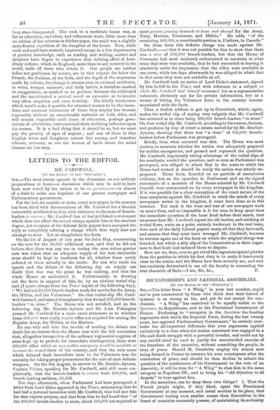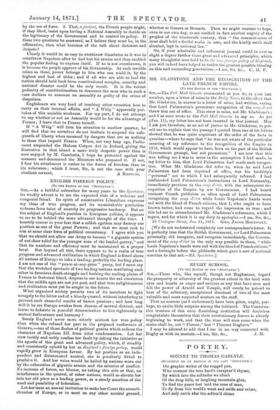DICTATORSHIPS AND NATIONAL ASSEMBLIES.
[TO THE EDITOR OF THE"SPECTATOR."]
SIR,—The letter from " A Whig," in your last number, ought not to pass unanswered by those who think that their hatred of tyranny is as strong as his, and yet do not accept his con- clusions. " A Whig" has contrived to be equally unfair to the Spectator, to Republicans, and to the Provisional Government of France. Professing to " recognize in the Spectator the familiar arguments with which the Imperial Press, during the last twenty years, has opposed Parliamentary Government," he entirely over- looks the all-important difference that your arguments applied exclusively to a time when the nation concerned was engaged in a life-and-death struggle with a powerful invader, and could not by any candid mind be used to justify the uncontrolled exercise of the functions of the executive, without consulting the people, in time of peace. Should M. Gambetta employ the armies now being formed in France to overawe his own countrymen after the restoration of peace, and should he then decline to submit the question of the continuance of his Government to the vote of an Assembly, it will be time for "A Whig" to class him in the same category as Napoleon HI., and to bring his " old objection to all despots" to bear against him.
In the meantime, can he deny these two things? 1. That the French people might, if they liked, upset the Provisional Government at any moment, and instal another in its place, that Government having even smaller means than Executives in the freest of countries commonly possess, of maintaining its authority
by the use of force. 2. That, a fortiori, the French people might, if they liked, insist upon having a National Assembly to decide on the legitimacy of the Government and to control its policy. If these two questions be answered, as I believe they must be, in the affirmative, then what becomes of the talk about dictators and despots?
Clearly it would be as easy to overthrow Gambetta as it was to -overthrow Napoleon after he had lost his armies and thus enabled the popular feeling to express itself. If he is not overthrown, it is because the people approve of his dictatorship. At such terrible crises as these, power belongs to him who can wield it, by the highest and best of titles ; and if all who are able to lead the oration should hold back from constitutional scruples, anarchy and national disaster could be the only result. It is the veriest pedantry of constitutionalism to denounce the man who in such a 'ease declines to summon an assembly as guilty of the crime of despotism.
Englishmen are very fond of teaching other countries how to carry on their internal affairs, and " A Whig " apparently par- takes of this amiable weakness. For my part, I do not attempt to say whether or not an Assembly would be for the advantage of France; I leave that to France herself.
If "A Whig" will turn his attention to another quarter, he will find that we ourselves do not hesitate to suspend the safe- guards of liberty when menaced by dangers that are as nothing to those that imperil France. When, not very long ago, Parlia- ment suspended the Habeas Corpus Act in Ireland, giving the Executive in that island a more truly despotic power than is now enjoyed by M. Gambetta, I hope he protested against the measure and denounced the Ministers who proposed it. If not, I fear his attachment is rather to the forms of freedom than to its substance ; which I trust, Sir, is not the case with your



































 Previous page
Previous page